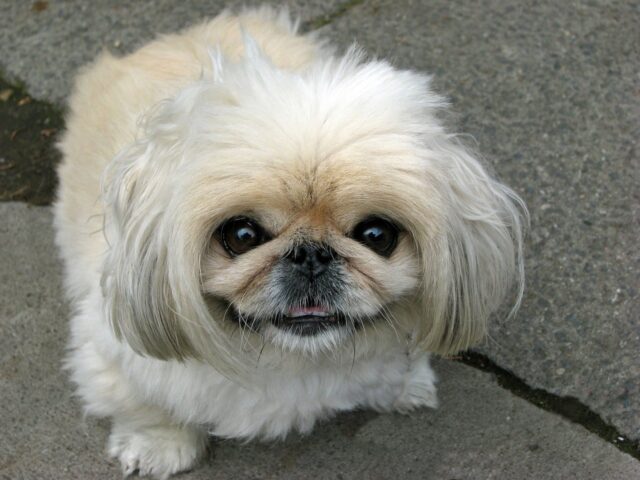Dogs are known for their voracious appetites and willingness to eat just about anything, but some dogs defy this stereotype by being incredibly picky eaters. These finicky canines can be a challenge for their owners, who must find the right foods to satisfy their pets’ selective tastes. Factors contributing to picky eating in dogs can include breed characteristics, individual preferences, and even health issues. If you’re dealing with a dog who turns its nose up at most meals, you’re not alone. Here are eight dog breeds known for being particularly picky eaters, listed in descending order.
8. Chihuahua
Chihuahuas are small dogs with big personalities, and this extends to their eating habits as well. Known for being fussy eaters, Chihuahuas often turn their noses up at food that doesn’t meet their high standards. These tiny dogs are prone to developing strong food preferences early on, making it important for owners to introduce a variety of foods during puppyhood. Chihuahuas can be sensitive to changes in their diet and environment, which can contribute to their pickiness. Despite their selective eating habits, Chihuahuas are loyal and affectionate companions who just need a bit of extra care when it comes to their meals.

7. Dachshund
Dachshunds, with their long bodies and short legs, are known for their stubborn and independent nature. This stubbornness often extends to their eating habits, making them one of the pickiest dog breeds. Dachshunds can be very particular about the texture and flavor of their food, often refusing to eat if their meals aren’t up to their standards. They are also prone to obesity, so it’s important to monitor their diet closely. Owners of Dachshunds often have to experiment with different foods to find what their pets like, ensuring they get the nutrition they need without giving in to unhealthy options.

6. Siberian Husky
Siberian Huskies are known for their high energy levels and adventurous spirit, but they can also be incredibly picky eaters. These dogs have a strong prey drive and were originally bred to work in harsh conditions, which can influence their eating habits. Huskies often have a smaller appetite compared to other breeds of similar size and can be very selective about their food. They prefer a diet that mimics their ancestral eating habits, which includes high-quality proteins and minimal fillers. Owners of Siberian Huskies need to be patient and persistent, offering a balanced diet that meets their pets’ nutritional needs without compromising on quality.

5. Shih Tzu
Shih Tzus are charming and affectionate dogs that can be quite finicky when it comes to food. These small dogs have delicate digestive systems and are prone to food allergies, which can contribute to their picky eating habits. Shih Tzus often prefers home-cooked meals or high-quality commercial dog foods with limited ingredients. They can be sensitive to changes in their diet and may refuse to eat if their food isn’t to their liking. Owners of Shih Tzus need to be attentive to their pets’ dietary preferences and health needs, ensuring they provide a balanced and appealing diet that keeps their furry friends happy and healthy.

4. Greyhound
Greyhounds are known for their sleek, athletic build and gentle temperament, but they can also be very picky eaters. These dogs have a fast metabolism and require a diet that is high in protein and fat to maintain their energy levels and muscle mass. Greyhounds can be sensitive to certain ingredients and may refuse to eat if their food doesn’t meet their nutritional needs. They also tend to have delicate digestive systems, making it important to choose high-quality, easily digestible foods. Owners of Greyhounds need to be diligent in finding the right diet that keeps their pets healthy and satisfied.

3. Pekingese
Pekingese dogs, with their regal appearance and dignified demeanor, are known for being finicky eaters. These small dogs have a tendency to develop strong food preferences and can be quite stubborn when it comes to their meals. Pekingese often prefer high-quality, flavorful foods and can turn their noses up at anything less. They can also be prone to dental issues, which can affect their eating habits. Owners of Pekingese need to be patient and persistent, offering a variety of foods to find what their pets enjoy while ensuring they receive a balanced diet that meets their nutritional needs.

2. Maltese
Maltese dogs are known for their beautiful, long coats and their affectionate nature, but they can also be incredibly picky eaters. These small dogs tend to be finicky about their food, often refusing to eat if their meals aren’t up to their standards. Maltese can be sensitive to certain ingredients and may prefer home-cooked meals or high-quality commercial dog foods with limited ingredients. Their small size and delicate digestive systems make it important to choose foods that are easy to digest and nutritionally balanced. Owners of Maltese need to be attentive to their pets’ dietary preferences and health needs, ensuring they provide a diet that keeps their furry friends happy and healthy.

1. Yorkshire Terrier
Yorkshire Terriers, or Yorkies, are small dogs with big personalities and very particular tastes when it comes to food. These dogs are known for their finicky eating habits, often turning their noses up at anything that doesn’t meet their high standards. Yorkies can be sensitive to changes in their diet and may refuse to eat if their food isn’t to their liking. They prefer high-quality, flavorful foods and can develop strong food preferences early on. Owners of Yorkshire Terriers need to be patient and persistent, offering a variety of foods to find what their pets enjoy while ensuring they receive a balanced diet that meets their nutritional needs.

In conclusion, these eight dog breeds are known for their picky eating habits, making them a challenge for their owners when it comes to meal times. Whether it’s due to breed characteristics, individual preferences, or health issues, these dogs require a bit of extra care and attention to ensure they receive a balanced and nutritious diet. Owners of these finicky eaters need to be patient and persistent, offering a variety of foods to find what their pets enjoy while meeting their dietary needs. With the right approach, even the pickiest of eaters can be satisfied and healthy, making them loving and loyal companions.
 Toledo, United States.
Toledo, United States.